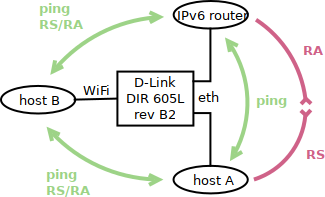If you have one of those very common D-Link DIR WiFi router/AP (such as the DIR-605L rev B2), you should know that they don’t get very well with IPv6. At least the vendor firmware doesn’t. Probably most people around here don’t even know and probably don’t even care. But that’s really no good 🙁
Apparently not all IPv6 messages seem to get through. ICMP6 echo-request on link-local addresses are not a problem. However RS messages between Ethernet ports don’t always get through. Here is a little diagram of what goes through and what doesn’t:
This was tested with FreeBSD 11.1-RELEASE-p9 and Debian 9.4.0 and on two different hosts (my trusty ol’ ThinkPad X201 and a homemade station with a Ralink Ethernet card). Still a lot of packets to test though. Don’t know if IPv6 packets themselves go through or not. However RS/RA don’t and that’s sufficient to make IPv6 completely unusable.
I will update the figure above when I know more. Although that may be never, don’t know yet. One solution would be to upgrade the firmware to either DD-WRT or Tomato router. However those are not supporter on the DIR 605L rev B2. Also this was supposed to be a replacement and we already bought a much better alternative.


